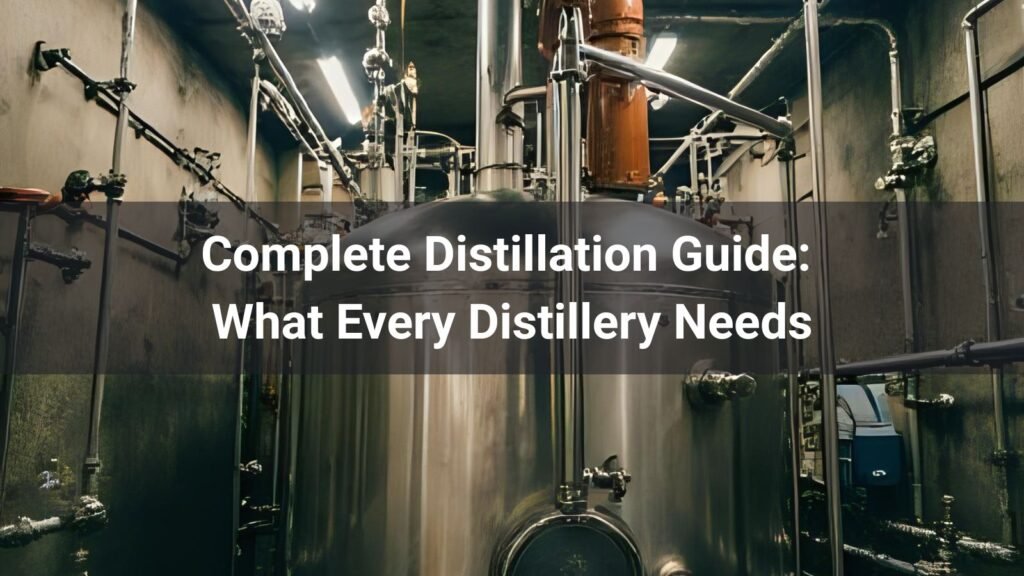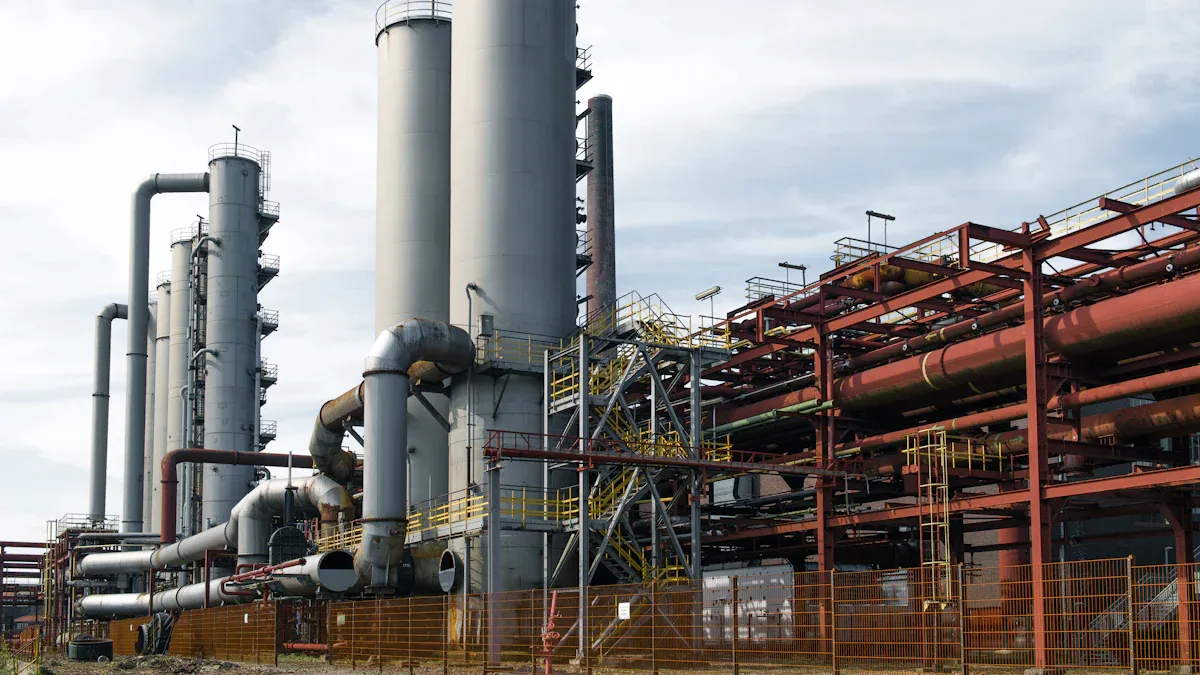
Table of Contents
In the world of modern distillery operations, understanding the fundamental equipment requirements is essential for producing high-quality spirits. Establishing a successful distillery requires a comprehensive understanding of the specialized equipment necessary for transforming raw materials into exceptional alcoholic beverages. The distillation process involves multiple interconnected stages, each requiring specific equipment designed to handle the unique challenges of spirit production.
From initial mashing and fermentation to final distillation and storage, every piece of equipment must work in harmony to create exceptional products. Modern distilleries rely on advanced stainless steel equipment that ensures product quality, operational efficiency, and regulatory compliance. The selection of appropriate distillation equipment directly impacts production capacity, product consistency, and overall profitability of the operation.
What is distillation equipment?
Distillation equipment encompasses a comprehensive range of specialized vessels and systems designed to separate liquid mixtures based on different boiling points of their components. In the context of spirits production, this sophisticated equipment facilitates the concentration of alcohol from fermented materials while removing unwanted compounds and impurities that could negatively impact the final product quality.
The fundamental principle behind distillation equipment is controlled heating and cooling, allowing for the selective evaporation and condensation of alcohol vapors. Modern distillation systems incorporate sophisticated temperature and pressure controls, enabling precise separation of different alcohol fractions and flavor compounds that define the character of premium spirits.
Professional distillation equipment is typically constructed from high-grade stainless steel, offering excellent corrosion resistance, ease of cleaning, and compliance with stringent food safety regulations. These systems range from small craft distillery setups producing hundreds of gallons per batch to large industrial installations capable of processing thousands of gallons daily while maintaining consistent quality standards.
| Equipment Type | Primary Function | Key Features |
|---|---|---|
| Pot Still | Batch distillation | Copper or stainless steel construction, traditional flavor profiles |
| Column Still | Continuous distillation | High efficiency, precise separation, automated operation |
| Hybrid Still | Combined functionality | Versatile operation, multiple product capabilities |
| Reflux Still | High-proof distillation | Enhanced purity, adjustable reflux ratio |
Application of distillation equipment
Distillation equipment serves diverse applications across multiple industries, each requiring specialized configurations and operational parameters. Understanding these applications helps distillery operators select appropriate equipment and optimize their production processes.
Food and beverage industry
The food and beverage industry represents the largest application for distillation equipment, encompassing spirit production, flavor extraction, and beverage concentration processes. Distilleries use this equipment to produce various spirits including whiskey, vodka, gin, rum, and brandy.
Spirit production requires precise control over distillation parameters to achieve desired flavor profiles and alcohol content. Wine fermentation tanks often precede distillation equipment in brandy production, where fermented grape juice undergoes distillation to create premium spirits.
Craft distilleries particularly benefit from flexible equipment configurations that allow for small-batch production and experimental recipes. The equipment must accommodate various raw materials including grains, fruits, and specialty botanicals used in premium spirit production.
Chemical industry
Chemical manufacturing utilizes distillation equipment for separating and purifying various compounds. Industrial distillation systems handle solvents, petrochemicals, and specialty chemicals requiring precise separation techniques.
These applications often involve hazardous materials and extreme operating conditions, necessitating robust equipment design and comprehensive safety systems. Chemical mixing tanks frequently work in conjunction with distillation equipment to prepare feedstock and process intermediate products.
The chemical industry demands equipment capable of handling corrosive materials, high pressures, and elevated temperatures while maintaining product purity and operational safety.
Pharmaceutical industry
Pharmaceutical manufacturing requires distillation equipment that meets stringent purity and regulatory standards. These applications include solvent recovery, API (Active Pharmaceutical Ingredient) purification, and sterile water production.
Pharmaceutical distillation equipment must comply with cGMP (current Good Manufacturing Practice) guidelines and undergo regular validation processes. The equipment design emphasizes cleanability, traceability, and contamination prevention.
Specialized features include sanitary connections, documentation systems, and validated cleaning procedures to ensure product safety and regulatory compliance.
Petroleum refining
Petroleum refining represents one of the largest industrial applications for distillation equipment. Crude oil refining involves multiple distillation stages to separate various petroleum products based on their boiling points.
Refinery distillation columns operate continuously, processing thousands of barrels of crude oil daily. These systems require robust construction, advanced process control, and comprehensive safety systems due to the hazardous nature of petroleum products.
The equipment must handle wide temperature ranges, corrosive compounds, and varying feedstock compositions while maintaining operational efficiency and product quality.
Environmental science
Environmental applications utilize distillation equipment for water treatment, solvent recovery, and waste stream processing. These systems help reduce environmental impact by recovering valuable materials and treating contaminated streams.
Distillation plays a crucial role in water purification, removing contaminants and producing high-purity water for industrial and municipal use. The equipment must handle varying feed compositions and maintain consistent product quality.
Environmental distillation systems often incorporate energy recovery features to minimize operating costs and reduce environmental footprint.
Bioengineering
Bioengineering applications include biofuel production, pharmaceutical biotechnology, and specialty chemical manufacturing from biological feedstocks. These processes often involve temperature-sensitive materials requiring gentle distillation techniques.
Vacuum distillation systems are commonly used in bioengineering applications to reduce operating temperatures and prevent thermal degradation of sensitive compounds. The equipment must accommodate biological materials and maintain sterile conditions when required.
Integration with fermentation systems is common in bioengineering applications, where stainless steel fermenters produce biological products that undergo subsequent distillation processing.
What equipment is needed for a distillery?
A complete distillery operation requires a comprehensive suite of equipment working in coordination to transform raw materials into finished spirits. Each piece of equipment serves a specific function in the production process, and proper selection ensures optimal product quality and operational efficiency.
Mash Tank
Mash tanks serve as the starting point for most distillery operations, where raw materials such as grains are mixed with water and enzymes to convert starches into fermentable sugars. These vessels must provide efficient mixing, temperature control, and uniform heat distribution throughout the mashing process.
Modern mash tanks feature advanced stainless steel mixing tank designs with powerful agitation systems capable of handling viscous mashes. The tanks typically include steam heating systems for precise temperature control during the mashing process.
Key specifications for mash tanks include:
- Capacity ranging from 500 to 10,000 gallons depending on production scale
- High-efficiency agitation systems for uniform mixing
- Steam heating jackets or coils for temperature control
- Insulation to minimize heat loss and improve energy efficiency
- CIP (Clean-in-Place) systems for automated cleaning
Fermentation Tank
Fermentation tanks house the critical process where yeast converts fermentable sugars into alcohol and carbon dioxide. These vessels must maintain optimal conditions for yeast activity while preventing contamination and managing fermentation byproducts.
Professional wine fermentation tanks share similar design principles with distillery fermentation vessels, though operating parameters may differ based on the intended product. Distillery fermentation typically produces a “wash” with alcohol content of 8-12% before distillation.
Essential features of fermentation tanks include:
- Temperature control systems to maintain optimal fermentation conditions
- Pressure relief valves to manage CO2 production
- Sample ports for monitoring fermentation progress
- Conical or sloped bottoms for efficient yeast removal
- Sterile connections and sanitary design
| Fermentation Parameter | Whiskey/Bourbon | Vodka | Rum |
|---|---|---|---|
| Temperature Range | 80-90°F | 75-85°F | 80-95°F |
| Duration | 3-5 days | 2-4 days | 3-7 days |
| Final Alcohol Content | 8-10% | 10-12% | 8-12% |
Still
The still represents the heart of any distillery operation, where fermented wash undergoes distillation to concentrate alcohol and develop flavor characteristics. Still selection significantly impacts product quality, production capacity, and operational flexibility.
Pot stills offer traditional distillation with enhanced flavor retention, making them ideal for premium whiskeys, brandies, and artisanal spirits. These systems typically require multiple distillation runs to achieve desired alcohol content and purity.
Column stills provide continuous operation with higher efficiency and precise separation capabilities. These systems excel in vodka production and high-volume operations where consistency and purity are paramount.
Hybrid stills combine pot and column technologies, offering operational flexibility to produce various spirit types from a single system. This versatility makes them attractive for craft distilleries producing multiple product lines.
Condenser
Condensers convert alcohol vapors back to liquid form, completing the distillation cycle. Efficient condenser design ensures maximum alcohol recovery while maintaining product quality and preventing vapor losses.
Shell-and-tube condensers offer robust performance with easy maintenance access. These systems handle varying vapor loads and provide consistent cooling performance across different operating conditions.
Plate heat exchangers provide compact design with excellent heat transfer efficiency. These condensers offer precise temperature control and reduced water consumption compared to traditional designs.
Storage tanks
Storage tanks house distilled spirits during aging, blending, and preparation for bottling. These vessels must preserve product quality while accommodating various storage requirements for different spirit types.
Stainless steel storage tanks provide inert storage for spirits that don’t require barrel aging, such as vodka and gin. These tanks prevent oxidation and contamination while maintaining product consistency.
Variable capacity tanks accommodate fluctuating inventory levels while minimizing air contact. Variable capacity wine tanks demonstrate similar principles applicable to spirit storage applications.
Storage tank specifications include:
- Food-grade stainless steel construction
- Inert atmosphere capabilities
- Temperature monitoring systems
- Sample ports for quality testing
- Volume measurement systems
Filtration Systems
Filtration systems remove particulates and impurities from distilled spirits, ensuring clarity and product quality. Different filtration methods address specific requirements for various spirit types.
Activated carbon filtration removes unwanted flavors and odors, particularly important in vodka production where neutral taste profiles are desired. Multiple filtration stages achieve progressive purification.
Membrane filtration systems provide precise particle removal with minimal product loss. These systems offer consistent performance and automated operation for high-volume applications.
Bottling Lines
Bottling lines package finished spirits for distribution and sale. Modern bottling equipment ensures product integrity, labeling accuracy, and production efficiency.
Semi-automatic bottling lines suit craft distilleries with moderate production volumes. These systems provide quality control while maintaining reasonable investment levels.
Fully automated bottling lines handle high-volume production with minimal operator intervention. Integrated quality control systems ensure consistent filling accuracy and label placement.
Pumps and pipes
Pumps and piping systems transfer products between different process stages while maintaining sanitary conditions and product quality. Proper pump selection ensures efficient operation and minimizes product degradation.
Centrifugal pumps handle most liquid transfer applications in distilleries, offering reliable performance and easy maintenance. Sanitary designs prevent contamination and facilitate cleaning procedures.
Positive displacement pumps provide precise flow control for critical applications such as bottling and blending operations. These pumps maintain accuracy across varying pressure conditions.
Cleaning equipment
Cleaning equipment maintains sanitary conditions throughout the distillery operation. CIP (Clean-in-Place) systems automate cleaning procedures while ensuring consistent results and regulatory compliance.
Automated cleaning systems reduce labor requirements and improve cleaning effectiveness. These systems typically include chemical dosing, temperature control, and documentation capabilities.
Portable cleaning units provide flexibility for equipment that cannot accommodate fixed CIP systems. These units maintain sanitary standards while offering operational convenience.
How to choose distillation and brewing equipment?
Selecting appropriate distillation and brewing equipment requires careful evaluation of multiple factors including production goals, product specifications, budget constraints, and operational requirements. Proper equipment selection forms the foundation for successful distillery operations.
Determine the target product.
Product specifications drive equipment selection decisions, as different spirits require distinct processing approaches and equipment configurations. Premium whiskeys demand different still designs compared to neutral spirits like vodka.
Traditional spirits benefit from copper pot stills that enhance flavor development through copper’s catalytic properties. These systems produce spirits with complex flavor profiles suitable for premium markets.
Neutral spirits require efficient separation to achieve high purity levels. Column stills with precise fractionation capabilities excel in producing clean, neutral products for vodka and gin production.
Multiple product lines may justify hybrid still systems that accommodate various production requirements. This flexibility allows distilleries to diversify their product portfolio while optimizing equipment utilization.
Choose the type of distillation equipment.
Equipment type selection depends on production volume, product quality requirements, and operational preferences. Each equipment type offers distinct advantages for specific applications.
Batch distillation systems provide operational flexibility and enhanced quality control, making them suitable for craft distilleries producing premium spirits. These systems allow operators to make real-time adjustments based on product development.
Continuous distillation systems offer higher throughput and operational efficiency for large-volume production. These systems maintain consistent product quality while minimizing labor requirements.
Modular equipment designs enable future expansion and operational flexibility. This approach allows distilleries to start with basic systems and add capabilities as production grows.
Consider output requirements
Production capacity requirements influence equipment sizing and configuration decisions. Accurate demand forecasting ensures optimal equipment selection while avoiding over-investment or capacity constraints.
Small craft distilleries typically require systems capable of processing 100-1,000 gallons per batch. These operations prioritize flexibility and product quality over maximum throughput.
Medium-scale operations benefit from systems processing 1,000-5,000 gallons per batch. These facilities require efficient operation while maintaining product quality and operational flexibility.
Large industrial distilleries demand continuous processing systems capable of handling 10,000+ gallons daily. These operations prioritize efficiency, consistency, and automated control systems.
| Production Scale | Typical Capacity | Equipment Type | Key Considerations |
|---|---|---|---|
| Micro Distillery | 50-500 gallons | Small pot stills | Flexibility, artisanal quality |
| Craft Distillery | 500-2,000 gallons | Medium pot/hybrid stills | Quality control, moderate efficiency |
| Regional Distillery | 2,000-10,000 gallons | Large hybrid/column stills | Efficiency, consistency |
| Industrial Distillery | 10,000+ gallons | Continuous column systems | Maximum efficiency, automation |
Materials and durability
Equipment materials directly impact product quality, operational lifespan, and maintenance requirements. Proper material selection ensures long-term reliability while maintaining product integrity.
Stainless steel construction provides excellent corrosion resistance and sanitary properties essential for spirit production. Grade 316L stainless steel offers superior performance in harsh chemical environments.
Copper components enhance flavor development in traditional spirits through catalytic reactions that remove sulfur compounds. Copper requires more maintenance but provides unique flavor benefits for premium spirits.
Composite materials offer specialized properties for specific applications. PTFE-lined components provide chemical resistance while maintaining sanitary conditions.
Budget and cost
Budget considerations encompass initial equipment costs, installation expenses, and ongoing operational costs. Comprehensive cost analysis ensures sustainable operations and adequate return on investment.
Initial capital costs vary significantly based on equipment complexity and capacity. Basic systems may require $100,000-500,000 investment, while comprehensive facilities can exceed $2-5 million.
Operational costs include utilities, maintenance, labor, and consumables. Energy-efficient equipment reduces long-term operating expenses while improving environmental sustainability.
Financing options include equipment leasing, loans, and phased implementation strategies. These approaches allow distilleries to manage cash flow while acquiring necessary equipment.
Technical support and after-sales service
Technical support and service capabilities ensure optimal equipment performance and minimize downtime. Reliable support relationships contribute significantly to operational success.
Comprehensive training programs help operators understand equipment capabilities and maintenance requirements. Proper training reduces operational errors and extends equipment lifespan.
Responsive service support minimizes downtime during equipment failures. Local service capabilities reduce response times and maintenance costs.
Spare parts availability ensures quick repairs and minimal production disruption. Comprehensive parts inventory and supply chain support maintains operational continuity.
Industry standards and certifications
Industry standards and certifications ensure equipment meets regulatory requirements and quality standards. Compliance is essential for legal operation and product marketability.
FDA compliance ensures equipment meets food safety requirements for spirit production. Sanitary design standards prevent contamination and ensure product safety.
ASME certification verifies pressure vessel safety and construction quality. These standards ensure safe operation under distillation pressures and temperatures.
ISO quality certifications demonstrate manufacturer commitment to quality and continuous improvement. These certifications indicate reliable manufacturing processes and quality control.
🤝 Partner with Shandong Chenma Machinery for Your Distillation Equipment Needs
Shandong Chenma Machinery Co., Ltd. specializes in designing and manufacturing high-quality stainless steel distillation equipment for distilleries worldwide. Our comprehensive approach includes process design, equipment manufacturing, installation, commissioning, and technical training to ensure your distillery operation succeeds.
Our 20,000 m² facility employs over 200 skilled professionals using state-of-the-art machinery to produce even the most technically demanding distillation systems. We customize equipment to meet your specific requirements, whether you need stainless steel tanks, complete distillation systems, or specialized processing equipment.
🏆 Our Certifications and Quality Assurance:
- ISO9001-2005 Quality Management System
- ISO14001-2015 Environmental Management System
- OHSAS18001-2007 Occupational Health Management System
- EU CE Certification for international markets
📞 Contact Information:
- Website: sdchenma.com
- WhatsApp: +86 18063421809
- Email: admin@sdchenma.com
- Address: Pingyuan County Economic Development Zone, Dezhou City, Shandong Province
From initial consultation to ongoing support, we provide turnkey solutions that optimize your distillation operations. Contact us today to discuss your project requirements and discover how our expertise can enhance your distillery’s success.
Frequently Asked Questions
Q: What’s the minimum investment required to start a craft distillery?
A: Initial equipment costs for a small craft distillery typically range from $200,000 to $800,000, depending on production capacity and equipment sophistication. This includes basic fermentation, distillation, and storage equipment but excludes building costs, licensing fees, and working capital.
Q: How long does it take to install distillation equipment?
A: Installation timelines vary by project complexity. Simple systems may require 4-8 weeks, while comprehensive distillery installations can take 6-12 months including planning, fabrication, delivery, installation, and commissioning phases.
Q: What maintenance is required for distillation equipment?
A: Regular maintenance includes daily cleaning procedures, weekly system inspections, monthly preventive maintenance, and annual comprehensive overhauls. Proper maintenance procedures extend equipment lifespan and ensure consistent product quality.
Q: Can distillation equipment handle multiple product types?
A: Many modern distillation systems offer flexibility to produce various spirits through adjustable operating parameters and modular designs. Hybrid stills particularly excel at producing different product types from the same equipment platform.



